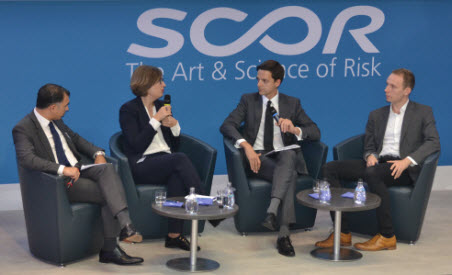SCOR Conference 2017 - Looking Forward, the Impact of Artificial Intelligence
October 25, 2017

The second day of the 2017 Annual SCOR Conference was dedicated to Artificial Intelligence and its impact on business and society.
Nicolas Miailhe, Co-founder and President of The Future Society at Harvard Kennedy School, highlighted key issues linked to the rise of AI and its capacity to disrupt the insurance sector. Artificial intelligence is a powerful tool that will help to improve risk profiling, he said, by delegating the process of assessing those risks to machines. However, as he explained in his presentation titled “Competing in the age of artificial intelligence: current state of artificial intelligence & interpretation of complex data”, this process in itself creates new risks: “We rely on algorithms, some of which use machine learning, and those systems are increasingly becoming black boxes”. More often than not, we have no idea of how these black boxes work. This makes it crucial to understand what AI is.
In a way, according to Miailhe, “AI is data”. Big data and its processing bring huge value, “but this value is based on correlation, not causation, and that creates a number of problems”. Today, he said, AI “is a matter of statistics, strictly statistics, and we tend to overestimate the convergence between the domains of statistics, information technology and neuroscience”. We live in a connected world, “we all have mobile phones, and those who master the flows of data rule the world. As I see it, the insurance industry is sitting in a very interesting spot to collect, store, process and circulate data”.
Nicolas Miailhe, Co-founder and President, The Future Society at Harvard Kennedy School
During the round table that followed, devoted to “How artificial intelligence affects/helps the industry and the (re)insurance industry”, Cécile Wendling, Head of foresight at AXA, said: “We are at the core of technological, regulatory and ethical disruptions and this is an issue that has to be addressed at the board level of insurance companies”. For Richard Hartley, co-founder and CEO of the insuretech startup Cytora, there is usually “a consensus among these boards that AI will bring an improvement of between 10 and 15% to the loss ratio of a primary commercial insurer”. And as Richard De Sousa, Managing Director for Europe and the Americas of ReMark International, pointed out, the impact is not restricted to (re)insurance companies: “Consumers are also getting better tools”.
From left to right: Richard De Sousa, Cécile Wendling, Will Thorne (moderator) and Richard Hartley
The round table addressed a broad range of issues linked to AI and its impact on the governance of companies, including the need for transparency, reliability and accountability. Concerning the threat that AI represents to underwriters’ jobs, Cécile Wendling said there are several things that can be done, the first being for people to carry on training. She also said companies need to ensure that machines replace the laborious or tedious parts of peoples’ jobs and actually empower humans. For Richard Hartley, the answer to this issue lies at the crossroads between data, projections and judgment: “Humans and machines can be seen either as complementary or as substitutes. Where risk is homogenous and standardized, machine predictions will become better than those of humans. But where risk is heterogeneous and ambiguous, and where there is less data, in space insurance for example, there remains a strong case for human judgment.”
Will Thorne, Innovation leader, The Channel Syndicate
Cécile Wendling, Head of foresight, AXA
Richard Hartley, Co-founder and CEO, Cytora
Richard De Sousa, Managing Director, Europe & Americas, ReMark International
Read the PDF

